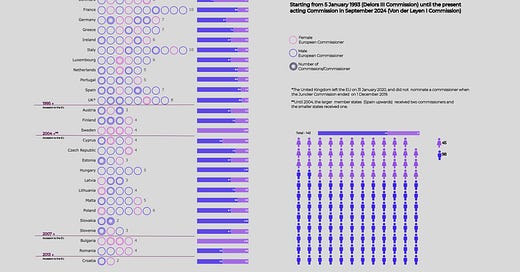A visual overview of European Commissioners by gender and EU Member States from 1993 to the present
Unlike Americans, for whom the ways federal structures work does not seem to be a complete nebula, my impression is that most Europeans - me included - understand very little of how this over-complicated structure called the European Union works.
Therefore, the recent debates about the proposal of a new commissioner from Romania for the second Von der Leyen Commission, whose sole purpose seems to be gender parity, raised several questions for me. All the more after Romania's latest proposal, Mrs. Roxana Mînzatu stated in a recent interview that misogyny is a grave concern in Europe as a result of the increase in support for parties labeled as extreme right. Just by reading the press, there was a considerable risk that one would remain with the impression that we are among the most misogynistic states in the EU!
But facts show that Romania supported women (for the European Commission and not only) even before being asked so insistently to do so! So, why were we being asked to drop our initial proposal, Mr. Victor Negrescu? Far from being a country completely free of misogyny, however, in Romania, we do not see the wage differences between women and men that we see in other Western countries, a sign that misogyny is no longer our biggest problem! Since Romania acceded to the EU, we have had two male and two female European Commissioners.
Then, of course, you can't help but think why this insistence on the two conventional genders until now, when we are currently being told, to the point of being threatened with communist re-education methods, that 'male' and 'female' are just some social constructs outdated that no longer have their place in a much more diverse society. So what will we do if our initial proposal, Mr. Victor Negrescu, suddenly announces that he identifies as a woman or Mrs. Roxana Mînzatu, the second proposal, suddenly announces that she feels more male than many men? As hilarious as these questions may have seemed in the past, they seem like serious questions today. As I have not yet found the answer to this contemporary dilemma, I wondered whether it would not be safer if meritocracy, proven experience, and expertise in a particular field, and with all the political considerations impossible to avoid, wouldn't be a better criterion when proposing a commissioner.
For years, or rather decades, I lived with the impression that one of our major problems was that 'we know too much but excel at nothing.' The Romanian educational system was often accused of this flaw: of producing graduates with a consolidated general knowledge background and not much else. After many reforms, we are almost flawless today and not much else. Anyway, you get the idea! We need specialists for performance. And being a specialist implies that you are an excellent connoisseur of a field and not a know-it-all. Having this in mind, I wondered if a better and more correct way to propose a new commissioner would not be to know from the beginning the assigned portfolio. Nobody would propose a health specialist for transport corridor development, right?! No! From what I've understood so far from all the debates I've watched (of course, I might've watched the wrong debates!) is that countries must make proposals in such ways to reach gender parity in the new European Commission. And after negotiations, you'll see what portfolio your nomination gets! Taking a look at the list of those who have been European commissioners from 1993 until the present, one can see spectacular transitions from one portfolio to another, most probably depending on political interests in most cases, a sign that the rest of Europe also has its fair share of Jack of all trades politicians, and not only the Romanians!
And because the list mentioned above is long and you can hardly get an overall picture, I tried to visualize all this data to understand how much misogyny we can talk about within the European Commission, if ever it existed, if it exists, when and where, in which EU member states or if this topic is just another one to keep us busy. You draw your conclusions.
Click on the image for enlargement and clarity.
P.S.: Ivona’s Loft is free today. But if you enjoyed this post, you can support Ivona’s Loft by visiting some of her online shops where you can find all sorts of prints after her illustrations. Juniqe, Printoteca, and Redbubble. Your support will be much appreciated. Thank you!





